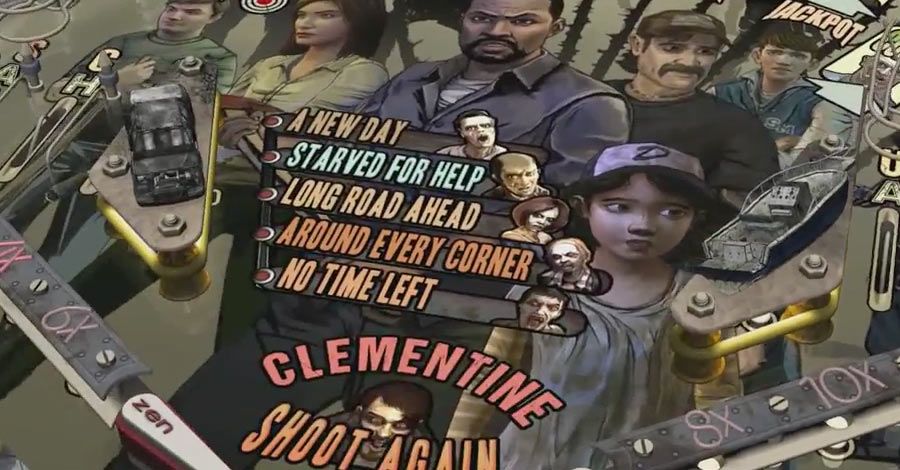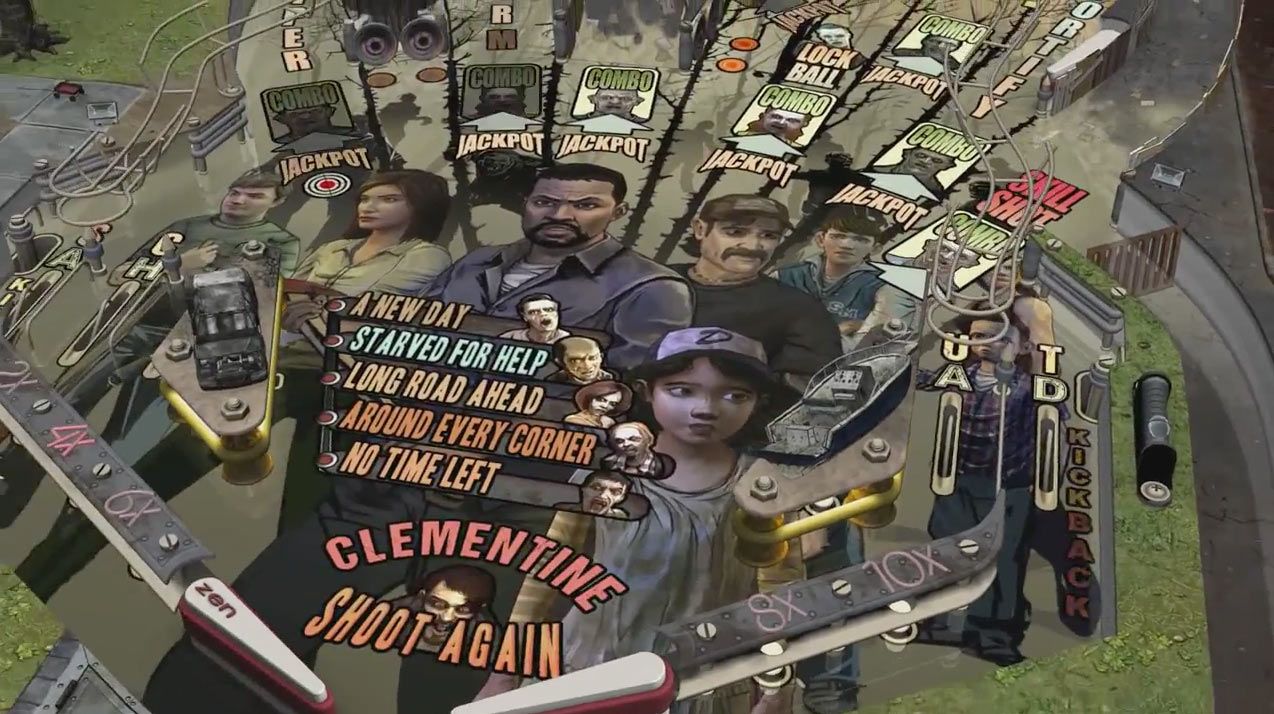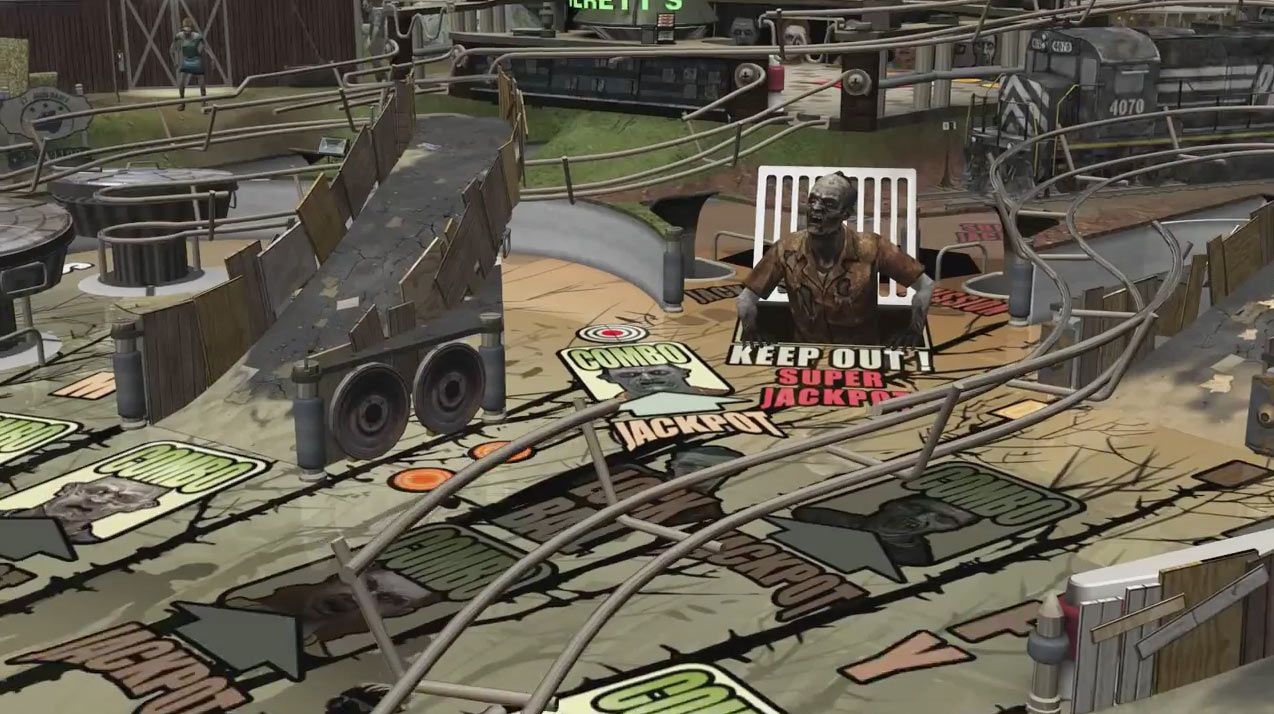One of the most successful indy comics of all time, "The Walking Dead" has been adapted to a number of different mediums -- prose novels, television, video games and even cars -- and now it's set to come to another platform later this year: pinball. Zen Studios, the developer responsible for the Zen Pinball video game (which features tables based on Marvel Comics, Star Wars and other pop culture franchises) has teamed with Telltale Games and series co-creator Robert Kirkman to adapt the first season of the critically acclaimed "The Walking Dead" game to a pinball table.
While it won't be a physical pinball table -- it's a new table for Zen's pinball video game, available on numerous platforms -- "The Walking Dead" pinball will incorporate a number of new features, including incorporation of choice-driven gameplay that made Telltale's game so popular.
REVIEW: Telltale's "The Walking Dead: Season Two - In Harm's Way"
To get a better handle on how "The Walking Dead" works as a pinball table, CBR News spoke with Zen Studios' Vice President of Publishing Mel Kirk, who discussed how the partnership between Zen and Telltale emerged, the potential of pinball as a storytelling medium and why "The Walking Dead" may just be Zen's best table yet.
CBR News: Mel, tell us a bit about how Zen Studios approached adapting Telltale's "The Walking Dead" into a pinball table.
Mel Kirk: Obviously, we have some experience working with other brands and licenses in the pinball world, and "The Walking Dead" is something that is huge and exciting and very current. One of our primary missions is to create tables based on what's happening in pop culture today. What the guys used to do back in the '70s and '80s is kind of reoccurring now. We had some friends over at Telltale -- we go back a long way -- and we got together during Comic-Con [International] last year and we just said, "Guys, we need to have a pin baby together. What can we do?" "The Walking Dead" was a primary target and we were able to work out an agreement really easily. Two indie-plus devs paving the way just got together and we decided to make it happen.
Telltale's take on "The Walking Dead" is all about choice. How does your version take that aspect and adapt it into a pinball table?
Being a pinball table, we have certain limitations. The game needs to exist with flippers and a ball, and that's the primary gameplay mechanic. But, as we are a video game, we can take certain liberties to push the boundaries of the game of pinball itself. We're able to create mini games, we're able to create different modes, which you activate by the traditional mechanic -- by hitting targets and dropping down sinkholes -- to activate modes which then allow you then to play out the key things in Telltale's "The Walking Dead": choice gameplay. There are actually modes we built into the table that enable you to actually experience that element of choice and make decisions that have an impact on how your game will play out during your session.
As you mentioned, Zen has obviously had a lot of experience adapting properties for pinball. What was it about "The Walking Dead" game specifically that made the team want to pursue creating a table around it?
It's a phenomenal game. It won game of the year from a number of outlets, with a lot of different accolades. It's a universe that is rich and beautiful. The story between Lee and Clementine is really powerful. I think, as players and fans, we were just really drawn to what Telltale had done. Also, having assets that already exist in 3D form, and having material that we could work with very easily was a huge draw. Also, Telltale understands games. That's their primary focus and their business. It's easier for us to work with somebody that understands development and the challenges we face.
We've been trying to improve the way that we tell stories through pinball tables. I think we're getting better at it. Just to draw reference to some of the other tables that we have, like "Marvel Civil War" or even "Moon Knight," we've been introducing tables with cutscenes and actual story setup where there's interaction between characters and some of the story is told. Players get familiar with the actual world and what's happening. I think we can take that a step further with "The Walking Dead," because it's a completely story-driven game.And because people are familiar with the story, there's a lot less education we need to do. When players jump in, they're really going to understand right away, "I'm back in Telltale's 'The Walking Dead.'" There's actually context as you play through the missions. It's not one-off occurrences. The voices and dialogue we've inserted into the game actually the story of Lee and Clementine.
It was mentioned at the game's announcement that there would be new story content for the game. Were the original voice actors for "The Walking Dead" season one brought back into the studio to record some new dialogue?
Yes, there is new dialogue. When you're making the table, you want to connect the events as much as possible, so we had to write new lines. We used the same talent and we're excited to actually have a little extra in our game that hasn't been seen or heard before.
Zen's pinball tables have featured a number of different voice talents -- for example, Nolan North did work on your upcoming Deadpool table -- how important was it to get the original voice talent from "The Walking Dead" season one to add to the experience of the game?
That's always critical. We feel like what we do here is extreme fan service, and down to every detail, it has to be correct. We need to use the original voices, we need to use the original assets and just make sure that the whole thing is 100% authentic and true to what people expect. We're not the star of the show -- we're very complementary to a brand like "The Walking Dead." To have a piece of this loading here at Zen Studios, we do everything we can to make sure it's 100% authentic.
How does this table compare to the work of some of the other tables you've done?
I'd say it's actually very similar. One of the things I hope people realize is that every table is built from the ground up. There's no re-skinning, there's no borrowing assets from one and applying it to another. We spend literally two months just making sure we have the concepts correct, that we're including the biggest moments. With "The Walking Dead," we went through the same process. We identified the most important elements, and that's a very collaborative process at that point; working with Telltale and working with Marvel, so that we capture the richest moments and make fans really excited about what we're making.
"The Walking Dead" follows the process -- it wasn't any bigger than any other story that we're working on at this point. I will say that the excitement is pretty huge -- just working on something this current and massive.
In terms of gameplay, what wrinkles in the traditional pinball formula can players expect, and how does "The Walking Dead" differ from some of the other Zen Pinball projects that you've released previously?
Yeah, there's one thing in particular. The whole table's awesome, but there's one mini game in particular. It's not something we've ever done before: there's a first person shooter moment where you have target practice and you're knocking down zombies. I think it's very smooth, the way you transition from the pinball table to this mini game. I think it shows a certain level of polish to take us from one experience right into another thing and go back to the table. It feels really natural, it's not clunky and it's visually smooth. I'm really excited about that element.
What excites you personally about publishing a product like this; developing it from scratch and getting it into players' hands?
The most exciting thing for me is being able to work with such a diverse group of people in this industry. Working with Telltale versus working with Lucas or Marvel or PopCap -- they're all very different experiences, but you get to meet a huge pool of talent. You get to learn a little something from them -- you pull something of what you learned from their team and you apply it to your skill set. That's helping Zen pioneer and create new types of pinball experiences that are exciting for people. Really, to be working on a game since 2005 when Pinball FX came out, here we are nine years later still able to do this and people are still excited. It's not all from us -- it's everything we've learned working with these amazing developers, and it's just incredible to have those experiences.
Coming up on your tenth year, what other big things are in the works for Zen moving forward?
It's going to be a very busy summer. This is probably our most exciting summer lineup we've ever had in front of us. We're joking around here internally -- we're calling it the "Summer of Pinball," a throwback to the old Summer of Arcade days. We've announced "Deadpool," we've announced "The Walking Dead." There's another Marvel thing coming; you'll hear about it soon. Late summer/early fall, a brand new IP that's never been in the Zen Studios library -- it's something totally different and really exciting.
"The Walking Dead" pinball hits later this year on consoles, PC and mobile stores.



